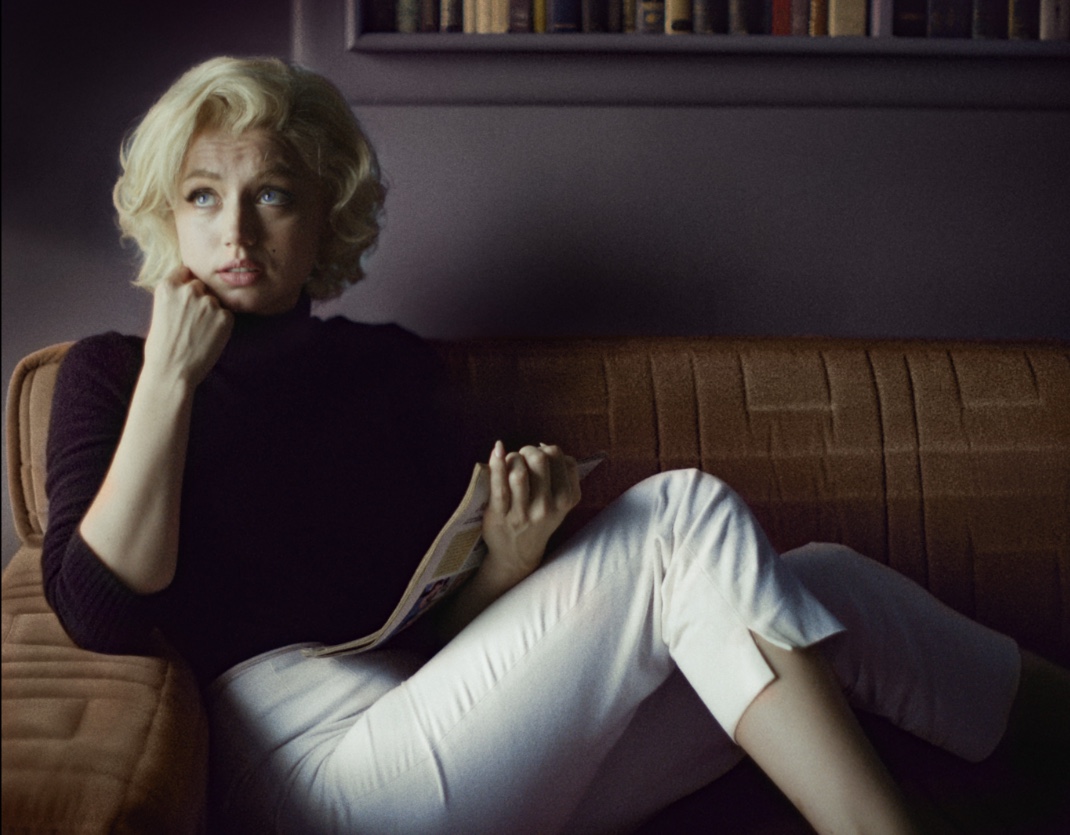
Film Review: Blonde
Film Reviews
Blonde
Director: Andrew Dominik
Plan B Entertainment
Streaming on Netflix 09.30
Once there was a woman called Marilyn Monroe, but her real name was Norma Jeane. She had breasts and daddy issues. There you go: I’ve now managed, in less than one paragraph, to convey everything of substance that writer-director Andrew Dominik tries to say in the nearly three-hour runtime of Blonde, the latest interminable Hollywood biopic.
Blonde, which is based—albeit loosely—on the novel by Joyce Carol Oates, is a dark telling of the life of Tinseltown’s most celebrated bombshell of the ’50s and ’60s, beginning with her lonely, troubled childhood in Los Angeles. Norma Jeane (Lily Fisher) lives in squalor with her unstable and abusive mother, Gladys (Julianne Nicholson, Mare of Easttown), who is constantly telling her daughter about the “movie star” father who had to leave but who would come back to them one day. The story then flashes forward to introduce us to Marilyn (Ana de Armas), the grown-up, emotionally stunted version of the little girl we’ve met. From here, we follow Marilyn from one toxic relationship to the next, as she is used and abused by the various men that come and go from her life and by an industry that makes Marilyn a star but has little use for Norma Jeane.
Blonde is beautifully photographed by Chayse Irvin (God’s Creatures, Hannah), moving from stark black and white to golden hues and making use of multiple aspect ratios. Domink (Chopper, The Assassination of Jesse James by the Coward Robert Ford) has gone to great effort to give Blonde the look of a deeply ambitious art film, and this makes the surprisingly lazy and stilted script all the more intolerable. The film leaves little room for subtext, as everything is spelled out so brazenly in the embarrassingly on-the-nose dialogue that there’s no room for misunderstanding or nuance.
Marilyn pines for her mythical father throughout, all the while calling each of her lovers “daddy” in every possibly disturbing context, and the leisurely pace of the film borders on aimlessness. Domink is determined to pull no punches in showing how Marilyn was exploited and mistreated, which could have been a laudable choice had he not taken such a “have your cake and ogle it, too” approach, getting in plenty of exploitation in his own right. The steady stream of nudity is trying (and failing) to titillate as much as to disturb, and when the sexual content finally reaches the point where you see where the NC-17 rating comes in, it has nothing more substantive to say than that birthday candles aren’t the only thing JFK had the starlet blow out, wink wink nudge nudge.
Ana de Armas is acting her heart out in a deeply committed and revelatory performance, doing everything in her power to do more than just give a spot-on impression, though she only gets a couple of scenes that give her anything to work with on that level. Adrien Brody is quite good in the brief amount of screen time he gets as playwright Arthur Miller, Marilyn’s third husband. The cast is all doing their best with cardboard characterizations, and each of them is failed by bad material in this sleazy, stupid, grease stain of a movie. Blonde is as trashy and insipid as it is endlessly pretentious and meaningless.
Blonde has enough talent assembled for a terrific film, and the subject matter of the way Hollywood treats its leading ladies was ripe for timeless and thoughtful exploration. As it stands, Blonde is perfectly suited to Netflix in that it’s nearly impossible to get through it in one sitting, and the only lasting impact it had on me was to remind of just how underappreciated Pablo Larrain’s Spencer was at last year’s Oscars. If it’s true that blondes have more fun, I would absolutely hate to have to sit through Brunette. –Patrick Gibbs
Read more reviews of biopics:
Film Review: Elvis
